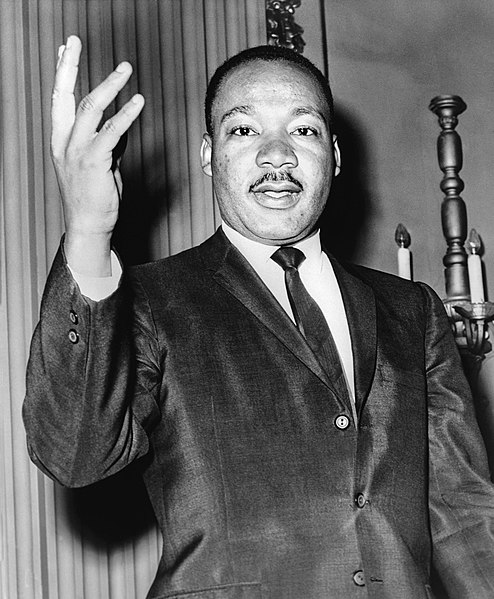This
chapter
is substantially more challenging that those that preceded it. Dr.
King's call to racial reconciliation and brotherhood is not only morally right, and in agreement with scripture, it is now
also now a rather popular idea. However, the radically ideas which gave
birth to King's demand for civil rights are unpopular as ever. There
remains much work to be done.
The fact that many Americans can now recognize and disprove of racism is good, but not good enough. Too
often we move beyond our duty to care for the marginalized
(
James 1:27), and we
chose to pass judgment and even pronounce condemnation over persons
who perpetrate injustice. In all of
A
Call To Conscience I've not once read Dr. King call for the
punishment of his enemies; this is his most Christlike attribute
(
Luke 23:34).
In obedience to the words of Jesus
Christ (
Matthew
5:43-47), King called for people of all races and nationalities
to love not only their kin, but their enemies as well. He encouraged
dialogue; he preached forgiveness. When his enemies would not submit
themselves to an ideology of peace and equality, he did not throw up
his hands and say that diplomacy had failed. He employed no secondary
strategy after love. He did not preach the unconditional love of God
as a means to an end, or a tactic to use before resorting to
violence. Instead, King rightly taught that the work of God's
unconditional love was the very purpose of human existence (
2
Corinthians 16:21).
I know that opinions on the wars in
Vietnam, Afghanistan, and Iraq are intensely divided, and tempers can
flare up quickly when they are discussed. I don't intend to discuss
them here. There are some who may find such fault with King's
speech in this chapter, that they cannot listen to the good word it
does contain. For this reason I've excerpted what I believe to be
essential, true, and worthy of Christian consideration. If you find yourself enraged by the idea of
objecting to any of these wars, please know that King spoke respectfully
of our soldiers; however, please spare yourself undo excitement,
and do not read this speech in it's entirety. I will leave you to
apply the following excerpt as wisely as you may.
“But even if it were not present, I
would yet have to live with the meaning of my commitment to the ministry of Jesus Christ. To me, the
relationship of this ministry to the making of peace is so obvious that I sometimes marvel at
those who ask me why I am speaking against the war. Could it
be that
they do not know that the Good News was meant for all men—for
communist and capitalist, for their children and ours, for black
and for white, for revolutionary and conservative? Have they forgotten that my ministry is in
obedience to the one who loved his enemies so fully that he died for them? What then can I say to the
Vietcong or to Castro or to Mao as a faithful minister of this one?Can I threaten them with death or must
I not share with them my life?
Finally, as I try to explain for you
and for myself the road that leads from Montgomery to this place, I would have offered all that was most
valid if I simply said that I must be true to my conviction that I share with all men the calling to be a
son of the living God. Beyond the calling of race or nation or creed is this vocation of sonship and
brotherhood. Because I believe that the Father is deeply concerned, especially for His suffering
and helpless and outcast children, I come tonight to speak for them. This I believe to be the
privilege and the burden of all of us who deem ourselves bound by allegiances and loyalties which are
broader and deeper than nationalism and which go beyond our nation’s self-defined goals and
positions. We are called to speak for the weak, for the voiceless,
for the victims of our nation, for those it
calls "enemy," for no document from human hands can make these humans any less our brothers.
….
A true revolution of values will lay
hand on the world order and say of war, "This way of settling differences is not just." This
business of burning human beings with napalm, of filling our
nation’s homes with orphans and widows, of
injecting poisonous drugs of hate into the veins of peoples normally humane, of sending men home
from dark and bloody battlefields physically handicapped and psychologically deranged, cannot be
reconciled with wisdom, justice, and love. A nation that continues year after year to spend more
money on military defense than on programs of social uplift is approaching spiritual death.
[sustained applause]
America, the richest and most powerful nation
in the world, can well lead the way in this revolution
of values.
There is nothing except a tragic death wish to prevent us from
reordering our priorities so that the pursuit of peace will take
precedence over the pursuit of war. There is nothing to keep us
from
molding a recalcitrant status quo with bruised hands until we have
fashioned it into a
brotherhood.
This kind of positive revolution
of values is our best defense against communism. [applause]
” -
Beyond
Vietnam,
King
1967
